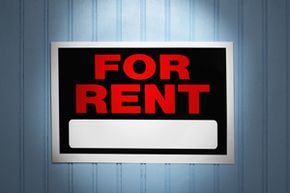Rental agreements and leases are binding legal contracts that establish the specific terms of the arrangement between the landlord and his tenant. The difference between rental agreements and leases is that rental agreements usually cover short-term or month-to-month rentals, while leases cover six-month and yearlong rentals [source: Move.com]. Rental agreements automatically renew after 30 days, and leases need to be renewed when they expire.
In England, there are two different kinds of rental agreements: shorthold tenancies and assured tenancies. The default arrangement is a shorthold tenancy, in which the landlord can automatically regain possession of the property after six months, as long as he gives two months' written notice. With assured tenancies, landlord can only repossess a property if he can prove to a court that the tenant is behind on rent or violating rental policies [source: Communities and Local Government]. In Brazil, the default rental agreement is for 30 months [source: Global Property Guide].
A rental agreement or lease should include the following terms:
- names of all occupants
- limits on number of occupants
- length of tenancy
- amount of rent, when it's due and how to pay it
- amount of security deposits and fees
- landlord responsibilities
- landlord rights
- code of conduct
- pet regulations
- miscellaneous restrictions like parking, use of common areas and laundry facilities [source: Stewart]
A rental agreement or lease document protects both landlords and tenants. The terms of the agreement help protect the landlord against irresponsible tenants and protect the tenant against overzealous or illegal landlords.
Landlords and tenants should pay particular attention to the language in the lease regarding the security deposit and how it will be used. A security deposit is money that the tenant lends to the landlord to cover the cost of any future damages or repairs that exceed the definition of normal use, which we'll learn about shortly [source: California DCA]. Security deposits are the most common cause of legal disputes between landlords and tenants.
There are several important distinctions here. The money is lent -- not paid -- to the landlord. Some states require landlords to keep security deposits in a separate bank account like an escrow account [source: Nolo]. Upon termination of the lease, that money will be paid back to the tenant (with interest, in some states) unless the tenant has damaged the property beyond normal wear and tear.
So what's normal use? This is something that needs to be clearly explained in the lease. For example, carpets get dirty, paint gets chipped and drains get clogged. Each of these situations is considered normal use. But, for example, if a tenant illegally uses his apartment to run a small bakery, and the constant heat from the oven permanently damages the kitchen tiles and peels away the paint on the ceiling, that's not normal use. The damages will be deducted from the tenant's security deposit.
The best way for landlords and tenants to avoid security deposit disputes is to take plenty of photos of the property before the tenant moves in. Both the landlord and tenant should document any existing damage and sign a waiver or disclosure stating that the current tenant will not be responsible for those repairs. In Australia, it's typical for landlords and tenants to fill out an official Property Condition Report before signing the lease [source: Tenants Advice Service].
Even after the rental agreement or lease is signed, a landlord shouldn't hand over the keys until the security deposit and first month's rent checks have cleared. If a landlord allows a tenant to move in immediately, and the checks later bounce, the only recourse may be eviction proceedings.
As the idiom goes, "An ounce of prevention is worth a pound of cure." So, let's look at the landlord's most important responsibilities to his tenants.







